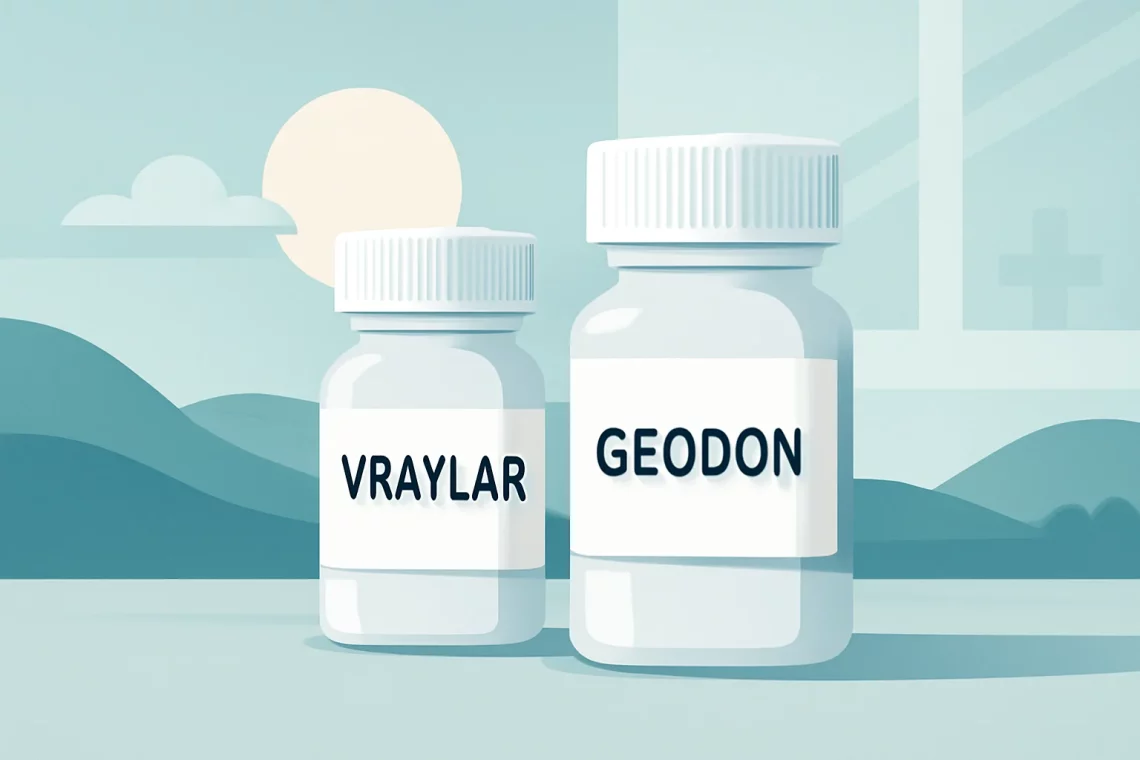
Vraylar vs Geodon: A Comprehensive Comparison of Antipsychotic Medications
Vraylar and Geodon are both medications commonly used in the treatment of mental health disorders, particularly schizophrenia and bipolar disorder. Each of these drugs belongs to a class known as atypical antipsychotics, which are designed to help manage symptoms of these conditions by altering the effects of neurotransmitters in the brain. The choice between Vraylar and Geodon can significantly impact a patient’s quality of life, as both medications have different mechanisms of action, side effects, and efficacy profiles.
In recent years, there has been a growing interest in understanding how these medications compare, as patients and healthcare providers alike seek the most effective treatment options available. Factors such as dosage, administration methods, and individual patient responses play crucial roles in determining which medication might be the best fit for a specific individual. Understanding these differences is essential for making informed decisions regarding treatment plans.
This article aims to provide a comprehensive overview of Vraylar and Geodon, exploring their uses, benefits, and potential side effects. By delving into these aspects, patients and caregivers can better navigate their treatment options and engage in meaningful discussions with healthcare providers about the best course of action for managing their mental health conditions.
Mechanisms of Action
The mechanisms of action for Vraylar and Geodon are central to their effectiveness in treating conditions like schizophrenia and bipolar disorder. Understanding how these medications work at a biochemical level helps clarify their therapeutic effects and side effects.
Vraylar, or cariprazine, primarily acts as a partial agonist at dopamine D2 and D3 receptors in the brain. This means that it can stimulate these receptors to some extent while also blocking them, depending on the prevailing levels of dopamine. This dual action is thought to help balance dopamine levels, which can be particularly beneficial for individuals experiencing psychotic symptoms or mood dysregulation. Additionally, Vraylar has effects on serotonin receptors, which further contributes to its mood-stabilizing properties.
On the other hand, Geodon, or ziprasidone, also targets dopamine and serotonin receptors, but its mechanism is slightly different. Geodon acts as an antagonist at dopamine D2 receptors and a serotonin 5-HT2A receptor antagonist. This means it blocks the action of dopamine and serotonin at these specific sites, which can help alleviate symptoms of psychosis and stabilize mood. Geodon is unique in that it also inhibits the reuptake of serotonin and norepinephrine, potentially enhancing its antidepressant effects.
Both Vraylar and Geodon are effective in managing symptoms of schizophrenia and bipolar disorder, but their differing mechanisms may lead to variations in patient response. Some individuals may respond better to one medication due to their unique neurochemical makeup, while others may experience side effects that make one option preferable over the other.
Side Effects and Considerations
When considering treatment options with Vraylar and Geodon, it is crucial to evaluate the potential side effects associated with each medication. Understanding these side effects can empower patients and their families to make informed decisions and prepare for any challenges that may arise during treatment.
Vraylar is generally well-tolerated, but like any medication, it can cause side effects. Common side effects include nausea, vomiting, and restlessness. Some patients may also experience sedation or insomnia, as the drug can influence sleep patterns. More serious side effects, though less common, can include tardive dyskinesia, a potentially irreversible movement disorder, and metabolic changes such as weight gain, diabetes, or dyslipidemia.
Geodon also has its share of side effects. Patients taking Geodon may experience dizziness, sedation, or gastrointestinal issues. One significant consideration with Geodon is the potential for cardiac side effects, including QT prolongation, which can lead to serious heart rhythm issues. This risk necessitates regular monitoring of heart health for patients using this medication, particularly those with a history of heart problems.
Both medications carry a risk of metabolic side effects, though this may be more pronounced with other atypical antipsychotics. Patients should maintain regular check-ups with their healthcare providers to monitor their health and make adjustments to their treatment plan as necessary. Ultimately, the choice between Vraylar and Geodon should involve a thorough discussion about the potential risks and benefits, taking into account the patient’s medical history and lifestyle.
Dosing and Administration
The dosing and administration of Vraylar and Geodon are key factors that can influence treatment adherence and overall effectiveness. Understanding how to properly take these medications can help patients maximize their benefits while minimizing side effects.
Vraylar is typically prescribed as a once-daily oral capsule, with or without food. The initial dose is usually low and may be gradually increased based on the patient’s response and tolerability. It is essential for patients to follow their healthcare provider’s instructions regarding dosing to achieve optimal results. Missed doses should be taken as soon as remembered, but patients should skip the missed dose if it is close to the time for the next scheduled dose.
Geodon, on the other hand, is usually taken twice daily and is recommended to be taken with food to enhance absorption. Like Vraylar, the dosing may start low and be adjusted based on individual needs. It is crucial for patients to adhere to the prescribed regimen to avoid fluctuations in medication levels, which can impact efficacy and increase the risk of side effects.
Both medications require consistent use to achieve the best therapeutic outcomes. Patients should work closely with their healthcare providers to develop a plan that accommodates their lifestyle and preferences while ensuring the medication is taken as directed. Regular follow-ups can help assess the effectiveness of the treatment and allow for any necessary adjustments.
Patient Experiences and Efficacy
Patient experiences with Vraylar and Geodon can vary significantly, influencing the perceived efficacy of each medication. Understanding these experiences can provide valuable insights for individuals considering these treatment options.
Many patients report positive outcomes with Vraylar, noting improvements in both mood stabilization and psychotic symptoms. Some have found that the medication helps reduce episodes of mania and depression in bipolar disorder, leading to a more balanced emotional state. However, others may experience side effects that impact their quality of life, such as sedation or gastrointestinal issues. This variability underscores the importance of personalized treatment plans.
Similarly, patient experiences with Geodon can be mixed. While some individuals find success in managing their symptoms, others report challenges with side effects, particularly related to sedation and cardiovascular health. The requirement for bi-daily dosing may also be a barrier for some patients, leading to issues with adherence. However, those who respond well to Geodon often cite significant improvements in their ability to function daily.
Ultimately, the effectiveness of either medication can depend on various factors, including individual biology, the presence of co-occurring disorders, and lifestyle factors such as diet and exercise. Ongoing communication with healthcare providers is essential for optimizing treatment and addressing any concerns that may arise during the course of therapy.
In conclusion, both Vraylar and Geodon are valuable options for individuals seeking treatment for schizophrenia and bipolar disorder. However, their differences in mechanisms of action, side effects, dosing, and patient experiences highlight the importance of personalized medicine in mental health care.
**Disclaimer:** This article is not intended to provide medical advice. Always consult a healthcare professional for diagnosis and treatment of any health-related concerns.




